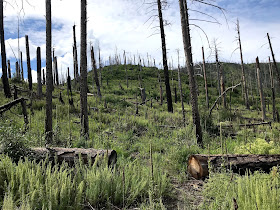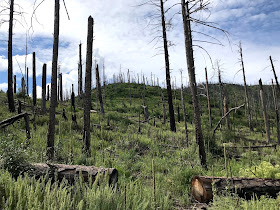We went out to the Black Range back on the last weekend of August a little bit desperate just to get in some forest time. After going over Emory Pass we noticed, what we thought were patches of snow (?!) along the roadside ( later on we would figure out that it probably was hail that had melted and refrozen). It can get cool up there when a big storm blows in, but snow in August we had never seen. Down at the Railroad Canyon campground and trailhead, it was damp and in the 60's as we parked amongst the many cars. We knew most of them were probably there because of a trail work weekend out at Holden Prong ( FT 114), and I also figured that the participants weren't enjoying themselves too much over there, as we looked at the high water in Gallinas Creek and knew it had been a wet week in the higher country. I'm not sure why August, when we are usually still in the midst of the monsoon, was thought to be a good time for trail work, but for our part we decided on a dry land hike and got back in the car and headed up to Emory Pass.
Now I knew there had been some trail work to repair the Sawyers Peak Trail in recent years, and I had been wanting to check it out, although admittedly, traipsing along the high ridge in late August when thunderstorms are still a threat was not my plan. Still, it was a couple of hours before noon and reasonably cool, so even though the trek appears to be almost completely devoid of shade these days ( due to the Silver Fire in 2013), we thought we would do okay. Early on, thorny locust was thick covering the tread, and not much fun for our low slung Scotties. There is a small remnant of the conifer forest as the trail turns slightly to the east, but that's about it, the rest of the ridgeline and upper parts of the stream canyons are covered with nothing but low growing oak, locust, weeds and maybe few tiny aspen with the many standing snags left over from the fire for as far as the eye can see.
We continued on for about a mile. In some places the trail was clear and the tread good. In others it was washed out or completely covered by locust, or both. I kept wondering when we would get to the first switchback ( having hiked this trail at least a half dozen times in the years before the fire, I knew what to expect) which takes hikers over the ridge where the trail continues on the east side.When we came to what I knew had to be the spot with some stone steps that was once in deep forest I was puzzled for a minute or two. Finally I could just barely make out the upper leg of where the trail once was, all but invisible in the oak and locust brush. We headed back. As for the trail conditions on the east side of the ridge, perhaps we'll see on another day. We had our picnic in the forest remnant we had passed early on, and when I heard the first distant thunder, it was time to shake a leg.
The stages of weather anxiety on a typical summer day in New Mexico run something like this:
1. "What a beautiful blue sky! I don't think it's going to rain today."
2. "It's just a few white clouds. They don't look stormy."
3. "There's more clouds and they're looking darker. It's going to rain but not for a little while longer"
4. "It's raining . . . and hailing! Hope we can make back to car before getting struck by lightning."
We did get a little wet, but the hard rain ( and hail!) didn't start coming down and till we were driving back down the mountain. I remembered, as I've written about in this blog before, why the Gila really isn't a forest for visiting in the summer, but if you do, get an early start ! So it goes. . .






My wife and I hiked to Sawyers Peak on 4/24/22. Some of the trails seems like it was cleared last year, but at about 2.5 miles it virtually disappears into a mess of down trees. The junction with the trail to Silver Creek is obliterated, but by bushwacking to the ridge, we found the old trail, which was in relatively good shape. We signed in to the register at the peak (in a glass jar) with a burned stick, as there was no pen, apparently the first people there since last November. A good hike, incredible views, but not much growing back, except grasses and shrubs.
ReplyDelete